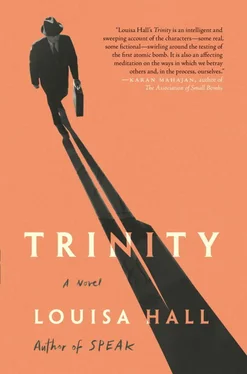For months, she said, she was embarrassed, though now when she looked back on that night, she wished that instead of feeling embarrassed, as though it were her fault I’d ignored her, she’d felt what she should have: anger, and pain, to be so disregarded by the one person she’d decided to trust.
But we’re always blind, she said, in the moment when we need to see.
Then she told me that, for the record, by the time Opje and Kitty were married, he didn’t live on Shasta Road anymore. It was Jean, she said, who was with Opje when he lived on Shasta Road. Jean went with us to the dockworkers’ strike. Then Jean and Opje broke up, and a few months later Opje got together with Kitty, and a few months after that, Kitty was pregnant. Then they got married and moved into that ranch house.
And Jean, Barb said, had to watch him move on that quickly, as though her memory didn’t haunt him at all.
It must have been very painful, Barb said. Such a complete eradication of what they were together.
Then Barb asked, incidentally, if I ever wondered whether I’d wound up on the blacklist because of my connection to Opje. And she reminded me that all his former students—those nim nim boys I was so fond of—had ended up drafted, or blacklisted, or imprisoned for taking the Fifth. Barb said some people in Berkeley thought he’d given the names of his former Communist friends, perhaps to keep his position on the bomb project.
A real trail of ruin he’s left in his wake, Barb said.
And now he’s running around like that little Dutch boy, giving talks on world peace, trying to put his finger in the hole in the dike, but it’s only a matter of time before the Soviets test one of those bombs.
Then she said that, speaking of water, it was Jean, not Kitty, who was with us that night we went swimming, and she asked whether I knew that Jean had drowned herself in her bathtub.
Then she said that while I’d certainly described a very fun dinner party in Paris, she couldn’t believe Robert Oppenheimer was happy, not with all that blood on his hands.
Tens of thousands of dead in Japan, she said, and more dying still as a result of the radiation sickness our government made such a point of denying.
He may have seemed happy, Barb said, but she’d seen Kitty in the salon, and Kitty told her things had been bad since they left the mesa, that Robert had been very troubled, and that she was the one who bore the brunt of the burden.
(So they go to the same salon, I thought, and wondered if Barb also wore her hair short now, and rounded and sprayed into the shape of a helmet. Then I imagined a whole bunch of American women with their hair sprayed in the shape of a helmet, and I thought, What’s happening in California! Is there some army forming, some battalion of embittered American women, all wearing their hair like a weapon?)
Then Barb said, in conclusion, that while she appreciated the sentiment in my letter, for her, the unpleasant things still existed.
If you want to forget them, she said, so be it. I can’t force you to remember what you don’t want to. Regardless, I wish you well, and I hope life with the most recent graduate student is everything impossible you’ve always allowed yourself to believe in.
At one A.M. it’s still raining. The test is scheduled for three o’clock, and several scientists approach Oppenheimer in the mess to express their concern about exploding the device in this weather.
They favor postponement. In weather like this, if the bomb does explode, the rain will absorb the radioactivity. The wind could unpredictably shift. Who knows how far the dangerous material could spread.
Oppenheimer listens, then consults Hubbard, the chief meteorologist on the project. Hubbard consults his instruments. He assures Oppenheimer that the storm will pass before sunrise, then recommends delaying the test to sometime between four and five o’clock in the morning.
Drawn by the commotion, General Groves joins the group. He dislikes Hubbard and mistrusts his predictions. “I’ll hang you if you’re wrong,” he says to the meteorologist.
Groves is suspicious of information based on balloons. But he’s also opposed to postponement. The bombs, he feels, must be delivered on schedule. Imagining the scientists might persuade Oppenheimer to put off the test, he now orders Oppenheimer to accompany him to the command hub at South Shelter, ten thousand yards from the test site. They drive through the rain, then enter the shelter, where they join a group of several generals, technicians, and scientists, including Oppenheimer’s brother, Frank, whom Oppenheimer has put in charge of the shelter.
At 2:30 A.M. it’s still raining. Oppenheimer and Groves go outside. They pace the grounds, their eyes turned toward the sky, which is occasionally rent by flashes of lightning. In those moments of light, the mountains come staggering out of the darkness.
“If we postpone,” Oppenheimer says, according to Groves, “I’ll never get my people up to pitch again.”
So he wants to finish. At least according to Groves. He wants to get it over with, to head off this uncertainty about whether the device will really go off.
The rain is still pouring down on the tower, the detonator wires, the bodies of the dead mice, but Oppenheimer and Groves decide the test should proceed. They go back inside. They reschedule the test for five thirty.
Testimonial 4
Sally Connelly
Princeton, 1954
I’LL GET TO ROBERT, I PROMISE.
I’ll tell you everything he told me that afternoon—about Jean and the friends he lost and what he imagined the army would do with the bombs he delivered—when he came into my office at the institute and said he wanted me to know the whole story.
But first I need to go back several steps.
Once upon a time, when I was twenty, before I worked for Robert at the institute, I was married to a person named Stan. Stan was a nice, decent person from New Jersey. I married him in 1952, two years before Robert’s security hearings, seven years after he left the position at Los Alamos. That was when we were still at war in Korea, and Robert was still advocating against testing the H-bomb, and I’m going to get to him in a moment, but I need to get this all out while I can.
When I met Stan, I was still a junior at Rosemont. I didn’t care much about science. Ever since I was a girl, I’d been caught up in secret ambitions to write a Great American Novel.
But that was something I never admitted out loud. It would have been an absurd thing to say, like announcing I hoped to become king of England. Who had ever heard of a girl writing a Great American Novel, let alone a debutante from the Main Line.
Anyway, my parents disapproved of their daughters’ pursuing the arts. A dignified, marriageable degree in art history was one thing, but actually pursuing an artistic life was for WASPs who could afford to flaunt their neuroses.
We, on the other hand, as representatives of our religion, had to show at all times how cheerful and mentally stable we were. How in control of our sensuous aspects.
My parents wanted us to play sports. We competed, but never too aggressively. It was essential to never reveal anything resembling a temper. My father rowed like Grace Kelly’s father. My mother played tennis, on the court my father built in the backyard, because the clubs on the Main Line weren’t open to Catholics.
Still, my secret dream was to write novels, though on the outside I took tennis lessons and worked hard to pretend that my great ambition in life was to accomplish an exemplary husband.
Читать дальше












